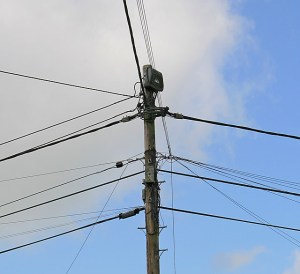
But the kicker comes on the very last page of the presentation and is titled “AT&T Proposes to Sell its Retired Copper to CLECs” where they describe how they would offer abandoned copper to other carriers. You can see this Powerpoint here.
Let me put this into context. In Docket FCC-11-161A1 the FCC kicked off the process to begin the transition of the PSTN from today’s TDM based technology to an all-IP network. The FCC is proposing that carriers get together to replace the network that used today to interexchange voice traffic between them.
But AT&T has taken the opportunity to open the discussion of how they might be able to walk away from their old copper. In network terms, AT&T’s copper network is called their distribution network, meaning the network that they use to get from their central offices to customers. The FCC has never expressed any interest in requiring that the distribution networks should become all-IP. There are still millions of miles of very serviceable copper, and with newer technologies like G-Fast any copper in good condition can deliver pretty decent broadband speeds.
But AT&T keeps using this regulatory process to lobby the FCC to let them start walking away from customers on copper. Last year they said that they wanted to walk away from millions of copper lines and that in rural areas they plan to instead serve people using cell phones. Anybody who has tried to find bars of data on their cellphone in a rural area can tell you that there are huge parts of the geography in this country where there is no cellular data service. So what AT&T is really telling the FCC is that they want to abandon rural America.
In this presentation AT&T comes along with another idea to try to soften the FCC on this topic. This slide shows that they plan to sell abandoned copper to CLECs, which is their way to assure the FCC that these customers won’t really be abandoned when AT&T walks away. But this is incredibly cynical and supposes that any CLEC would actually want their old copper. There are a lot of practical issues involved in what AT&T is proposing that would not make this a very attractive business plan for a CLEC.
- They want to sell the copper but not the customers and not the central office. There are plenty of companies who would be interested in buying the whole shebang, but AT&T wants to keep everything in the office that is served with fiber and just sell the old wires. This means the new CLEC would start on day one with no customers or revenue.
- AT&T would require a CLEC to operate this copper from a collocation inside their office. This is incredibly difficult and costly. Collocation rules require CLECs to use costly paperwork to make any change inside of an AT&T central office. Doing something as simple as changing a power supply requires a detailed application and waiting for AT&T’s approval. In a case where a CLEC bought all of the copper in an office this paperwork would make it impractical to act competitively.
- I have no idea how this would be practical on hybrid loops, meaning customers who are served both on fiber and copper. A good example would be a subdivision where AT&T has built fiber to the front of the subdivision and then jumps onto copper to get to homes. That kind of copper cannot be accessed from a collocation in a central office but requires an even more costly collocation where a CLEC has to build an access cabinet next to the existing AT&T one in the field. Because of this almost nobody competes today on hybrid loops.
- AT&T wants CLECs to take over the full cost and maintenance of the old copper. That is mind-boggling, particularly in rural areas where this copper has been ignored and is in bad shape. AT&T and Verizon basically walked away from rural areas decades ago and shut down business offices, got rid of most technicians and stopped making new investments or even spending for normal maintenance. Look at the mess that Frontier got when they bought West Virginia from Verizon to understand the condition of rural copper.
AT&T is trying every tactic they can think of to make the FCC think it’s a good idea to let them walk away from rural copper. I can promise if they do so that there are going to be a whole lot of customers who will go dead and find themselves with no telephone or data service. If AT&T really wants out of the rural business they should sell the whole exchanges as Verizon has done. The idea of keeping the best part of their offices and only shedding the old copper is one of the more hair-brained ideas I’ve ever heard from AT&T. I can’t imagine any CLECs that will sign up for this idea. I really don’t think AT&T thinks this will work, but they are just hoping that the FCC staff is naïve enough to feel good about this if they think that abandoned customers will have an alternative.